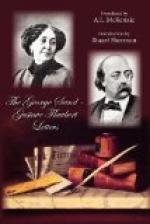You, oh! fanatical troubadour, I suspect you of amusing yourself at your profession more than at anything in the world. In spite of what you say about it, art could well be your sole passion, and your shutting yourself up, at which I mourn like the silly that I am, your state of pleasure. If it is like that then, so much the better, but acknowledge it to console me.
I am going to leave you in order to dress the marionettes, for the plays and the laughter have been resumed with the bad weather, and that will keep us busy for a part of the winter, I fancy. Behold! here I am, the imbecile that you love, and that you call master. A fine master who likes to amuse himself better than to work!
Scorn me profoundly, but love me still. Lina tells me to tell you that you are not much, and Maurice is furious too; but we love you in spite of ourselves and embrace you just the same. Our friend Plauchut wants to be remembered to you; he adores you too.
Yours, you huge ingrate,
G. Sand
I had read the hoax of le Figaro and had laughed at it. It turns out to have assumed grotesque proportions. As for me, they gave me a grandson instead of two granddaughters, and a Catholic baptism instead of a Protestant. That does not make any difference. One really has to lie a little to divert oneself.
CI. TO GEORGE SAND Saint Sylvester’s night, one o’clock, 1869
Why should I not begin the year of 1869 in wishing to you and to yours “Happy New Year and many of them”? It is rococo, but it pleases me. Now, let us talk.
No, I don’t get into a heat, for I have never been better. They thought me, in Paris, “fresh as a young girl,” and those people who don’t know my life attributed that appearance of health to the air of the country. That is what conventional ideas are. Every one has his system. For my part, when I am not hungry, the only thing I can eat is dry bread. And the most indigestible food, such as apples in sour cider, and bacon, are what cure me of the stomach-ache. And so on. A man who has no common sense ought not to try to live according to common-sense rules.
As for my frenzy for work, I will compare it to an attack of herpes. I scratch myself while I cry. It is both a pleasure and a torture at the same time. And I am doing nothing that I want to! For one does not choose one’s subjects, they force themselves on one. Shall I ever find mine? Will an idea fall from Heaven suitable to my temperament? Can I write a book to which I shall give myself heart and soul? It seems to me in my moments of vanity, that I am beginning to catch a glimpse of what a novel ought to be. But I still have three or four of them to write before that one (which is, moreover, very vague), and at the rate I am going, if I write these three or four, that will be the most I can do. I am like M. Prudhomme, who thinks that the most beautiful church would be one which had at the same time the spire of Strasbourg, the colonnade of Saint Peter’s, the portico of the Parthenon, etc. I have contradictory ideals. Thence embarrassment, hesitation, impotence.




